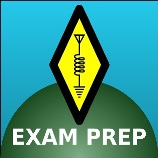
Getting a ham radio license is not difficult. Yes, there is a test that must be passed, but remember...you are asking for a privilege that will allow you to operate on frequencies that are close to commercial, military, scientific and other users, not just within the United States, but globally. It is a unique thing. Yes, hams are able to communicate in many different formats (we call them modes) of communication and some of them can be quite technical requiring some knowledge and skill to utilize.
There are 3 classes or levels of licensing that you can obtain. Each requires a bit more knowledge to obtain, but each also gives greater and wider operating frequencies. The starting or entry level is called the Technician class. This license grant conveys operation primarily on VHF and UHF frequencies. It involves some basic electrical knowledge, rules, regulations, operating procedures, radio wave propagation and other similar things. All license applicants will have to start at the Technician level even if the intent is to go all the way to the top class, Amateur Extra. Each must be passed sequentially. As a side note, that CAN be done in one exam setting if you so desire, but that would be a major undertaking to do all 3 license class exams at once. It is suggested that you get the Technician, get on the radio and start exploring the hobby and as you grow and learn, then aspire to upgrade your license.
The second level is the General class license. This particular class of license conveys a major growth in operating privileges. This opens up a whole spectrum of frequencies that you will be able to communicate for very long distances. The General class is one of the most sought after, as it gives the most spectrum for the test effort.
That last level,the top class, is known as Amateur Extra. This class of license conveys the most privileges, the most frequency spectrum and requires the most technical knowledge. There are no other higher levels of licensing beyond Amateur Extra in the amateur radio service. In the old days, this class of license also required proficiency in Morse code at 20 words per minute. At present, no class of amateur license requires proficiency in Morse code. It is still used, and not a requirement, it would be a good thing to learn eventually.

So now it's time to start the studies. The pool of questions from which the test will be made of, are not a secret. In fact they are published on the internet so you CAN properly prepare. As an added bonus (or two or three), in that question pool are the possible mis-direct answers and the correct answer. Each question is presented with the correct answer identified.
The nice thing (one of those bonuses) is that the test will present each question used worded exactly and each answer in the exact order and wording as in the question pool you study from! All you have to do is get yourself familiar with the questions and yes...you will learn some by memory along the way. If something doesn't make sense or you are confused on some of the technical terms, it is always a good idea to check with an Elmer.
Whats an Elmer you say? That is just a ham radio term for someone who has been licensed for a period of time and is knowledgeable on the subject and who is willing to coach, guide and teach the ways of the ham radio world. If you don't have one available, the internet has a lot of resources available and there are numerous groups on the various social media sites. We would be more than happy to Elmer you a bit if you are in our area. Just contact us and we'll get you connected with someone.

So you're now ready to test. Great! What has to happen now is you will need to sit for a written exam. In the old days in years back, you would need to travel to an FCC field office to take the exam and they were only given a few times per year. Now, the testing is done by a group of volunteer examiners that are comprised of licensed radio operators. They are overseen by a co-ordinator group such as the ARRL VEC. There is probably a groupof VEs that are nearby or in your area. They will typically hold an exam session on at least one weekend per month. Some have been known to set up private test sessions or schedule evening sessions to accommodate some people.
Locating an exam session is easy. Use this link (will open a new window) to the ARRL website: http://www.arrl.org/find-an-amateur-radio-license-exam-session then enter your information. It is usually a good idea to contact the VE for the exam session and double check on location, date and time. They may have had to reschedule or re-locate at a last minutes notice. Plus, it alerts them that they have someone who is interested in sitting for the exam.
The Lubbock ARRL VE test sessions are located at:
|
CONTACT INFO WB5R VE Team 10:00 AM (Walk-ins allowed) Gerald A. Grant (806) 416-4640 wb5rger(at)gmail.com |
TEST LOCATION American Red Cross 2201 19th Street Lubbock TX |
Put in a quick review and remind yourself...I know this...Get a good nights sleep and go test! You will need to bring a photo ID such as a driver's license and the testing fee which is typically $15.00. Bring along a pen and a couple of pencils. Calculators are allowed, but there are some specific features that are not allowed. If you are one of those that has decided to test all the way to the top on your first session, then the $15 will take you there. The one fee covers you as long as you keep passing tests. Plan on arriving a little early. Offer to help setup the test room.
A typical test session is approximately 3-1/2 hours long. That is the time it takes to run the whole VE testing session, not for you to take the test. You and your test time could take as little as 30 minutes...maybe less if you are well prepared. There are only 35 questions on the Technician test. The VEs will explain how the session runs and answer any questions you may have about the process. When you have finished, the VEs will inform you that you passed...or not. Some will let you retake the test on the spot if you desire, but it will require another test fee. It is certain that the retake will NOT have the same set of questions as did the first test. It's not over though. Put in some more study, come back next time and try again. The majority of those testing the first time do so successfully the first time, and if not then, then definitely on the second attempt. Key is being prepared.
On successful completion of the exam(s) you will be presented with a CSCE (Credit for Successful Completion of Examination) by the VEs. This is proof you passed. Hold onto it! It is a promise of things to come and will become invaluable should there be some sort of mixup or lost paperwork along the way. Patience. Your call is coming!
 Well Congratulations! You said you wanted to be a ham, well now you are one!
Well Congratulations! You said you wanted to be a ham, well now you are one! Here is the hard part. Waiting. You have to wait until your newly assigned callsign is shows up in the (opens new window) FCC database. This can take up to 3 or 4 weeks. Most get theirs sooner, but things happen between the end of the exam session and the FCC doing it's part. Patience...it's on the way. In the meantime, settle down with some ham friends, get yourself a radio and get ready to have fun!

FCC license in hand or callsign in databasee? Check!
Radio charged, connected and ready? Check!
Well what are you waiting for? Key that mic and talk!
As you are a newly minted ham, there are sure to be hundreds if not thousands of questions about a whole miriad of topics. Remember the Elmer? Use that. Thats one of the great things anbout ham radio. There are so many different ways of communicating that it is near impossible for someone to do them all. You will eventually settle into one or more that appeal to you. As you grow with the hobby, you may expand into different modes, different equipment and the various aspects of it such as contesting. Just don't give it up!
Now get on the air, make some contacts, get involved and enjoy. Share the hobby. Join a club. Start a club.
See ya on the air!....'73!